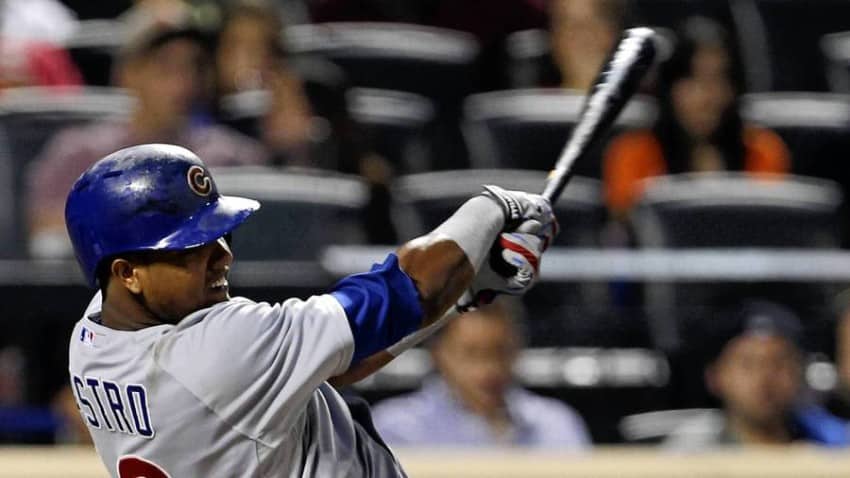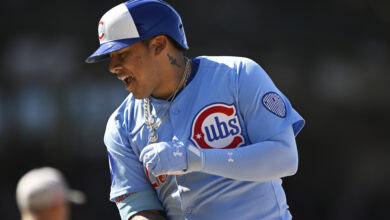
Starlin Castro Is Not a ‘Real Leader,’ But Maybe That’s a Good Thing
Remember the furor Charles Barkley stirred up over two decades ago when he declared that he was not a role model? It ended up being a pretty brilliant marketing ploy by Nike, but it also generated a great deal of debate in terms of athletes and the expectations we heap on them.
The advent and proliferation of social media and ubiquitous access to all manner of news from various sources has impacted the way we view the most famous faces among us. Where athletes were once universally lionized as demigods, we can now see them as fully mortal, for better or worse. The curtain has been pulled back on the Wizard of Oz, so to speak.
One need look no further than the city of Chicago for examples of the conflicts between expectation and reality. As Sun-Times columnist Rick Telander proved, not even the literary astronomers whose job it is to observe these stars are immune to this phenomenon.
Native son Derrick Rose has gone from idol to sacrificial goat and back…and then back again, all because he can’t stay healthy. Well, that and the fact the neither he nor his brother has much tact when it comes to discussing his intentions.
But this is a Cubs blog and I’m a Starlin Castro apologist, so it’s that polarizing part-time pariah on whom I’ll focus here. I’ve said before that Castro’s debut may have been the worst thing that happened to him. Blessed with preternatural skill, the young man lit the Cubs’ world on fire at a time when the team had little else to celebrate.
Presented with a lack of both leadership and talent, Castro became the focal point for fans who had grown tired of under-appreciating Alfonso Soriano (who, conveniently enough, was Castro’s Cubs mentor). It was as though the phenom was thrust into a bell jar and forced to perform, even as the air around him was pumped out.
The pressure from both that vacuum and the expectations of fans and the organization was evident, as Castro’s performance and focus dipped over time. But a funny thing happened last year as Anthony Rizzo emerged as the team’s leader: Castro bounced back as well.
It was just like Marty McFly playing guitar at the Enchantment Under the Sea dance, becoming insubstantial and insignificant until…boom! George fulfills their mutual density by kissing Lorraine and Marty snaps back up and proceeds to shred. I apologize if you’ve never seen Back to the Future.
Could the arrival of even more talent and leadership allow Castro to fade into the background while excelling statistically? Gordon Wittenmyer asked essentially the same question on Tuesday, noting that the team’s lack of both consistency and competitiveness may have hurt its shortstop’s focus.
There’s no doubt in my mind that Starlin can be a fundamental piece the Cubs’ future success, but does that mean we should expect him to be a leader? Hardly. The man said as much this week in Mesa when he echoed Barkley: “I’m not a real leader. I can help the young guys and I am still young, not a leader. We can be 25 guys leading the team and help each other.”
Theo Epstein seemed to approve of the comments, saying, ”There is some humility to that, too. Normally the guys going around pounding their chest and saying they are the leaders of the team maybe aren’t as much in reality.”
In saying he’s not a leader, Castro isn’t shirking the responsibilities attendant with his role. Rather, he’s admitting that he’s not perfect and saying that’s part of the team in general. After a rocky offseason, the three-time All-Star is focused on putting himself and his team in the right position to succeed.
”I can’t put myself in situations. I can be in my house and not have a problem,” Castro said. ”The problem isn’t coming out of your house. The problems come when you are in the wrong place.”
In declaring ”We have a team we can compete against anyone,” Castro is showing the same confidence evident in the words of both Joe Maddon and fellow All-Star Rizzo. And in making the not-yet 25-year-old shortstop to be the third voice in this chorus, the Cubs will actually allow him to lead in his own way.
Perhaps it’s as simple as taking Javier Baez, a man who could have taken Castro’s job from him, out to dinner. Maybe it’s staying out of unsavory situations and displaying more focus in the field — not “watching the trains,” as a friend of mine is wont to say.
Castro may never be the leader some fans feel they deserve, but if he can display that quiet confidence and maturity in baseball and beyond, he’ll become exactly the leader they need.

